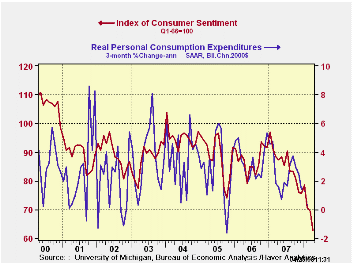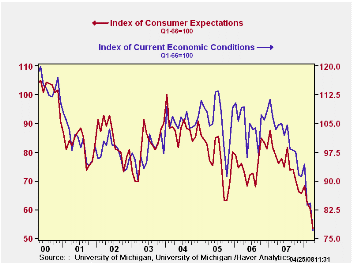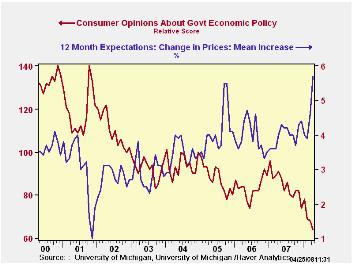 Global| Apr 25 2008
Global| Apr 25 2008Michigan Consumer Sentiment Lowest Since 1982
by:Tom Moeller
|in:Economy in Brief
Summary
The final April reading of consumer sentiment from the University of Michigan fell 9.9% m/m to 62.6, a bit more than the 9.1% decline in the preliminary figure. The drop was larger than Consensus expectations and it reduced the level [...]

The final April reading of consumer sentiment from the University of Michigan fell 9.9% m/m to 62.6, a bit more than the 9.1% decline in the preliminary figure. The drop was larger than Consensus expectations and it reduced the level of sentiment to the lowest level since 1982.
The current conditions index within overall consumer sentiment was weaker than indicated in the preliminary report. It fell 8.6% m/m after a slight rise during March. The view of current conditions for buying large household goods fell a hard 9.7% (-26.3% y/y) and the view of current personal finances fell a somewhat lesser 7.5% (-27.7% y/y).The view of current buying conditions for large household goods fell 25.7% y/y and 11% of respondents thought that prices were too high, nearly the largest percentage since late 1996. 
The expectations component of overall sentiment still accounted for the larger part of the April decline with an 11.3% m/m drop. The index fell to its lowest level since late 1990. Expectations for personal finances fell a sharp 10.7% m/m (-21.3% y/y). Expectations for business conditions during the next year fell an even sharper 13.0% (-54.0% y/y) and expectations for conditions over the next five years fell 12.3% m/m (-21.1% y/y).
Opinions about government policy, which apparently influence economic expectations, fell 5.9% m/m (-29.7% y/y) which was an even deeper decline than in the preliminary report. The percentage of those surveyed who indicated that they thought government was doing a good job fell to 7%, the lowest level since 1991 while 43% indicated that they thought government was doing a poor job.
The mean expected rate of inflation during the next twelve months rose further to 5.7%, the highest level since 1990.Has the Behavior of Inflation and Long-Term Inflation Expectations Changed? from the Federal Reserve Bank of Kansas City can be found here.
The University of Michigan survey is not seasonally adjusted.The reading is based on telephone interviews with about 500 households at month-end; the mid-month results are based on about 300 interviews. The summary indexes are in Haver's USECON database, with details in the proprietary UMSCA database.
PCE and CPI Inflation Differential: Converting Inflation Forecasts also from the Federal Reserve Bank of Kansas City is available here.
| University of Michigan | April (Final) | April (Prelim.) | March | Feb | April y/y | 2007 | 2006 | 2005 |
|---|---|---|---|---|---|---|---|---|
| Consumer Sentiment | 62.6 | 63.2 | 69.5 | 70.8 | -28.1% | 85.6 | 87.3 | 88.5 |
| Current Conditions | 77.0 | 78.4 | 84.2 | 83.8 | -26.4% | 101.2 | 105.1 | 105.9 |
| Expectations | 53.3 | 53.4 | 60.1 | 62.4 | -29.8% | 75.6 | 75.9 | 77.4 |
Tom Moeller
AuthorMore in Author Profile »Prior to joining Haver Analytics in 2000, Mr. Moeller worked as the Economist at Chancellor Capital Management from 1985 to 1999. There, he developed comprehensive economic forecasts and interpreted economic data for equity and fixed income portfolio managers. Also at Chancellor, Mr. Moeller worked as an equity analyst and was responsible for researching and rating companies in the economically sensitive automobile and housing industries for investment in Chancellor’s equity portfolio. Prior to joining Chancellor, Mr. Moeller was an Economist at Citibank from 1979 to 1984. He also analyzed pricing behavior in the metals industry for the Council on Wage and Price Stability in Washington, D.C. In 1999, Mr. Moeller received the award for most accurate forecast from the Forecasters' Club of New York. From 1990 to 1992 he was President of the New York Association for Business Economists. Mr. Moeller earned an M.B.A. in Finance from Fordham University, where he graduated in 1987. He holds a Bachelor of Arts in Economics from George Washington University.
More Economy in Brief
 Global| Feb 05 2026
Global| Feb 05 2026Charts of the Week: Balanced Policy, Resilient Data and AI Narratives
by:Andrew Cates






